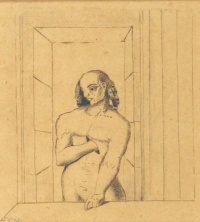Happiness
From The Art and Popular Culture Encyclopedia

Illustration: The Heart Has Its Reasons (c.1887) by Odilon Redon
Happy families are all alike; every unhappy family is unhappy in its own way. - opening line from Anna Karenina.

Illustration: Mona Lisa Smoking a Pipe (1883) by Eugène Bataille
|
Related e |
|
Featured: |
Happiness is an emotional or affective state that is characterized by feelings of enjoyment and satisfaction. As a state and a subject, it has been pursued and commented on extensively throughout world history. This reflects the universal importance that humans place on happiness.
Philosophical views
The Chinese Confucian thinker Mencius, who 2300 years ago sought to give advice to the ruthless political leaders of the warring states period, was convinced that the mind played a mediating role between the "lesser self" (the physiological self) and the "greater self" (the moral self) and that getting the priorities right between these two would lead to sagehood. He argued that if we did not feel satisfaction or pleasure in nourishing one's "vital force" with "righteous deeds", that force would shrivel up (Mencius,6A:15 2A:2). More specifically, he mentions the experience of intoxicating joy if one celebrates the practice of the great virtues, especially through music. Al-Ghazali (1058–1111) the Muslim Sufi thinker wrote the Alchemy of Happiness, a manual of spiritual instruction throughout the Muslim world and widely practiced even now.
About one hundred years later, the Hindu thinker Patanjali, author of the Yoga Sutras, wrote quite exhaustively on the psychological and ontological roots of bliss.
In the Nicomachean Ethics, written in 350 B.C.E., Aristotle stated that happiness (also being well and doing well) is the only thing that humans desire for its own sake, unlike riches, honor, health or friendship. He observed that men sought riches, or honor, or health not only for their own sake but also in order to be happy. Note that eudaimonia, the term we translate as "happiness", is for Aristotle an activity rather than an emotion or a state. Happiness is characteristic of a good life, that is, a life in which a person fulfills human nature in an excellent way. People have a set of purposes which are typically human: these belong to our nature. The happy person is virtuous, meaning they have outstanding abilities and emotional tendencies which allow him or her to fulfill our common human ends. For Aristotle, then, happiness is "the virtuous activity of the soul in accordance with reason": happiness is the practice of virtue.
Many ethicists make arguments for how humans should behave, either individually or collectively, based on the resulting happiness of such behavior. Utilitarians, such as John Stuart Mill and Jeremy Bentham, advocated the greatest happiness principle as a guide for ethical behavior.
Namesakes


